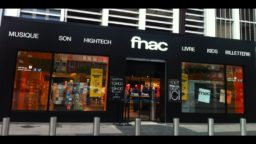The following MBW blog comes from an anonymous UK music retail veteran, written in response to the news that long-standing Tesco music buyer Michael Mulligan (pictured – yes, with David Bowie) is leaving his post. MBW understands that today (July 29) is Mulligan’s last at the supermarket, and he will not be replaced.
It’s a curious fact that record companies have never shown a lot of love for their biggest single revenue generators, the nation’s music retailers.
I’m told that Rob Dickins, the former head of Warner UK, used to take great delight in describing them as mere “outlets” to which one retailer memorably responded, “If we’re the outlets, you’re the ones creating the sh*t.”
Fast forward to the present day and the labels’ view of retailers hasn’t gotten much rosier.
When questioned about the prospect of the music industry ending up with just a handful of digital retail partners – Apple, Amazon, Spotify, Google – a more recent major label bigwig once cheerfully declared, ‘Bring it on. The fewer of the f*ckers I have to talk to the better.’
Be careful what you wish for.
Tesco, the UK’s biggest supermarket chain – and the world’s third biggest – is parting ways with longstanding head of music Michael Mulligan.
He will not be replaced.
It doesn’t take a genius to see that music is becoming a marginal activity for the supermarkets.
Mulligan, a self-confessed music nut, has been a good friend to music and the music business.
He extended CD albums to Tesco Express stores – one of the reasons why paradoxically physical outlets selling music are at an all-time high in 2016 – and most recently led the improbable charge by supermarkets into vinyl.
With his responsibilities now divided up between a broader entertainment team, it will be hard for Tesco to keep up that level of commitment.
And why should it? Music – at best a marginally profitable business for supermarkets – is becoming less and less financially relevant for these companies.
“It would be no surprise is one or more supermarkets decided music was more trouble than it’s worth.”
Labels: beware your attitude in the light of this fragile situation.
The entire retail value of the UK recorded music business – and that includes downloads and streaming – is equivalent to less than 3% of the annual sales in the UK of Tesco alone (£37.2bn at the last count).
It would be no surprise if one or more supermarkets decided music was more trouble than it is worth.
Even if they do not withdraw completely, music could easily lose its current prominent positioning and end up as a ‘dump bin’ impulse item (think Sellotape or barbecue utensils) or a purely seasonal item to be stocked alongside the tinsel and fairy lights.
The results for music would be devastating. Even now supermarkets account for around a third of UK album sales.
The good news is it’s not too late. And there is a precedent.
It may have taken the virtual demise of the indie record stores for major record companies finally to wake up to their true value, but thanks to Record Store Day they did – and indies are now thriving on the high street.
Perhaps we need an equivalent initiative to support supermarkets’ commitment to music.
The fact is that if supermarkets do pull out of music, the bulk of the revenue they generate will simply disappear.
Assuming it will simply pop up elsewhere is wishful thinking at best – and an illusion at worst.
Apple, Amazon, Spotify, have all done good things for music. Their interest and commitment are valued.
But, to all the labels out there, do you really want them to be the only “f*ckers” you have to talk to?Music Business Worldwide




